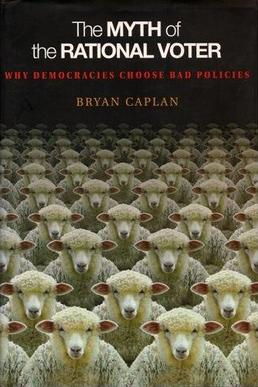Why do so many voters choose such bad policies? If you're left-wing, ask yourself why half the voting population votes for right-wing policies. If you're right-wing, ask yourself why half the voting population votes for left-wing policies. If you're neither, ask yourself both. Whatever your political alignment, it's obvious that at least half the population votes for bad policies.
For a long time, I thought the answer was intelligence and/or ignorance. But that doesn't actually explain the problem. People of all intelligence levels are competent at picking out what groceries to buy, where to live, how to not get shot by the police, etc. It's politics, metaphysics and theology where people's brains seem to turn off.
One might argue that these are tribal issues. But that doesn't quite explain it either. Computer operating systems are a tribal issue, but Apple users and Linux users do recognize the tradeoffs of our respective systems. What ethnicities of food you like is a tribal issue—and a subjective one too—but normal people can discuss it sanely[1].
What's wrong with democratic politics is that individual voters do not bear the consequences of our political choices. It's true that voters collectively bear the consequences of our political choices. But that doesn't matter.
Consider buying a pair of shoes. Suppose there are two identical pairs of shoes for sale. One of them provides \$100 of value. The other provides \$200. It takes you time and effort to figure out which pair of shoes to buy. It is worth spending up to \$50 of effort figuring out which pair of shoes to buy. (Since picking randomly gets you \$150.) If you spend less than \$50 of effort then you will end up ahead. If you spend more than \$50 of effort then you will end up behind. If your time is worth \$15 per hour, then it is worth spending at least three hours figuring out which pair of shoes to buy.
Now suppose you live in a city of 1,000,000 people who all vote on buying 1,000,000 pairs of shoes. The city taxes everyone equally and then distributes a pair of shoes to each resident. Suppose there are two similar options. The efficient option provides \$200 value per pair of shoes. The inefficient option provides \$100 value per pair of shoes.
On average, picking randomly, you will be receive \$150 in value. If the efficient option is selected then you will receive \$200 in value. You receive a similar-quality pair of shoes either way. How much effort is it rational for you to expend on figuring out which policy to vote for?
Suppose the odds of you swinging an election are 1 in 1,000,000. Then the amount of tax you avoid, on average, by voting the right way, is $\frac{\$50}{1,000,000}=\$0.00005$. One two-hundredth of a cent. If your time is worth \$15 per hour, then it is rational for you to spend no more than one hundredth of a second figuring out which policy to vote for.
You can run the calculation with different numbers, but the personal expected value of voting poorly in a democracy usually rounds to zero.
Meanwhile, the personal social consequences of declaring political positions are real. Women on Tinder declare they won't date Trump voters. An engineer gets fired from Google for claiming that personality differences between the sexes may contribute to the underrepresentation of women among programmers.
If you're rationally self-interested, then you should ignore the effect of your votes and subscribe to whatever political alignment makes your peers like you.
Voters don't ignore critical thinking and follow the herd because voters are irrational. Voters ignore critical thinking and follow the herd because voters are rational.

For more information, check out The Myth of the Rational Voter by Bryan Caplan.
[1] Except for animal welfare issues. ↩